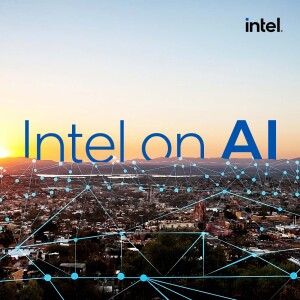
Designing Molecules with AI – Intel on AI Season 3, Episode 8
 2022-02-16
2022-02-16
In this episode of Intel on AI hosts Amir Khosrowshahi and Santiago Miret talk with Alán Aspuru-Guzik about the chemistry of computing and the future of materials discovery.
Alán is a professor of chemistry and computer science at the University of Toronto, a Canada 150 Research Chair in theoretical chemistry, a CIFAR AI Chair at the Vector Institute, and a CIFAR Lebovic Fellow in the biology-inspired Solar Energy Program. Alán also holds a Google Industrial Research Chair in quantum computing and is the co-founder of two startups, Zapata Computing and Kebotix.
Santiago Miret is an AI researcher in Intel Labs, who has an active research collaboration Alán. Santiago studies at the intersection of AI and the sciences, as well as the algorithmic development of AI for real-world problems.
In the first half of the episode, the three discuss accelerating molecular design and building next generation functional materials. Alán talks about his academic background with high performance computing (HPC) that led him into the field of molecular design. He goes into detail about building a “self-driving lab” for scientific experimentation, which, coupled with advanced automation and robotics, he believes will help propel society to move beyond the era of plastics and into the era of materials by demand. Alán and Santiago talk about their research collaboration with Intel to build sophisticated model-based molecular design platforms that can scale to real-world challenges. Alán talks about the Acceleration Consortium and the need for standardization research to drive greater academic and industry collaborations for self-driving laboratories.
In the second half of the episode, the three talk about quantum computing, including developing algorithms for quantum dynamics, molecular electronic structure, molecular properties, and more. Alán talks about how a simple algorithm based on thinking of the quantum computer like a musical instrument is behind the concept of the variational quantum eigensolver, which could hold promising advancements alongside classical computers. Amir, and Santiago close the episode by talking about the future of research, including projects at DARPA, oscillatory computing, quantum machine learning, quantum autoencoders, and how young technologists entering the field can advance a more equitable society.
Academic research discussed in the podcast episode:
- The Hot Topic: What We Can Do About Global Warming
- Energy, Transport, & the Environment
- Scalable Quantum Simulation of Molecular Energies
- The Harvard Clean Energy Project: Large-Scale Computational Screening and Design of Organic Photovoltaics on the World Community Grid
- Automatic Chemical Design Using a Data-Driven Continuous Representation of Molecules
- Optimizing Memory Placement using Evolutionary Graph Reinforcement Learning
- Neuroevolution-Enhanced Multi-Objective Optimization for Mixed-Precision Quantization
- Organic molecules with inverted gaps between first excited singlet and triplet states and appreciable fluorescence rates
- Simulated Quantum Computation of Molecular Energies
- Towards quantum chemistry on a quantum computer
- Gerald McLean and Marcum Jung and others with the concept of the variational quantum eigensolver
- Experimental investigation of performance differences between coherent Ising machines and a quantum annealer
- Quantum autoencoders for efficient compression of quantum data
More Episodes
Create your
podcast in
minutes
- Full-featured podcast site
- Unlimited storage and bandwidth
- Comprehensive podcast stats
- Distribute to Apple Podcasts, Spotify, and more
- Make money with your podcast
It is Free
- Privacy Policy
- Cookie Policy
- Terms of Use
- Consent Preferences
- Copyright © 2015-2024 Podbean.com






